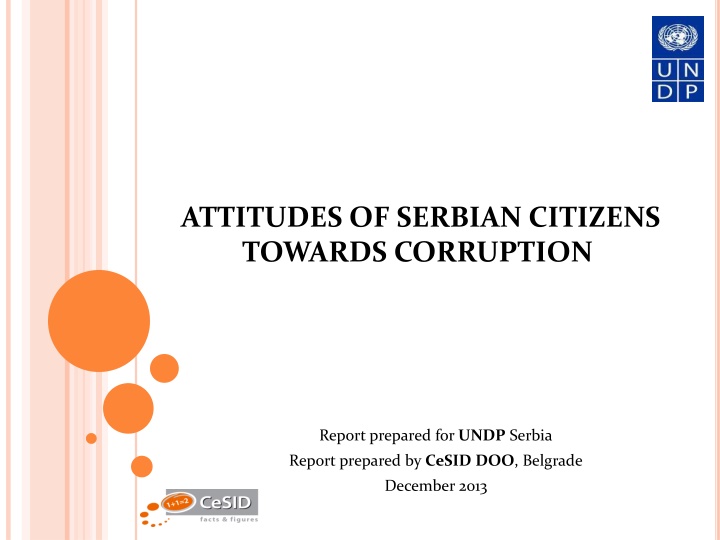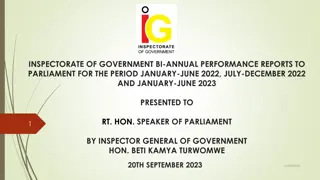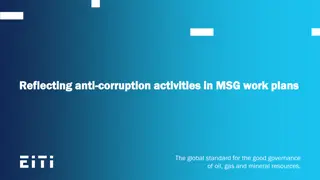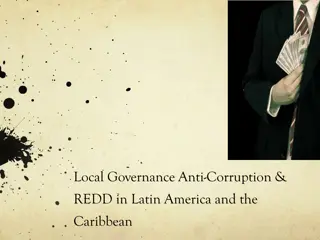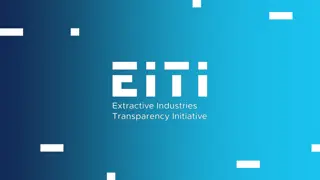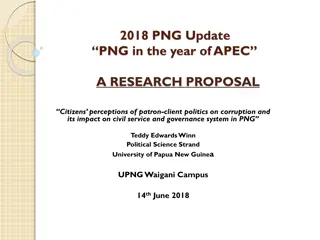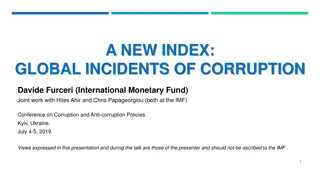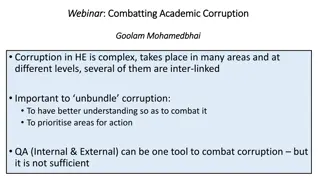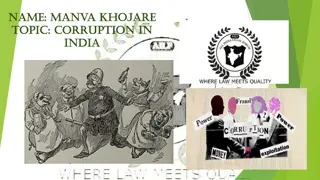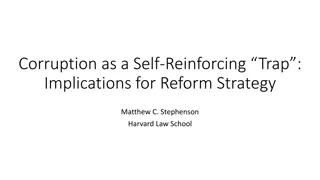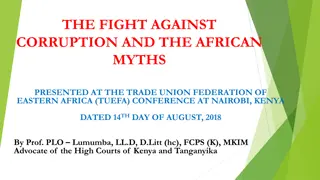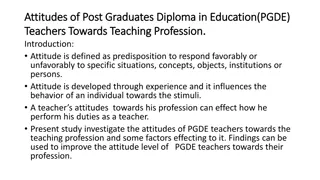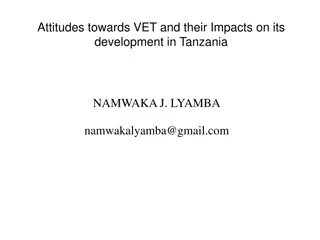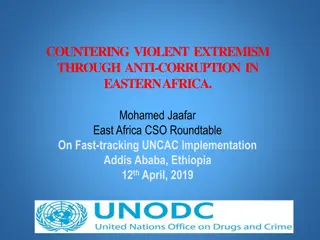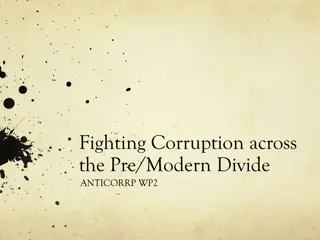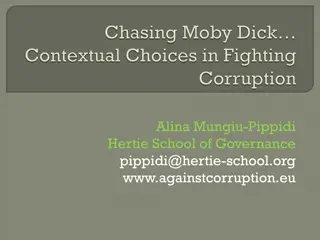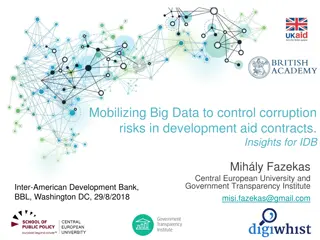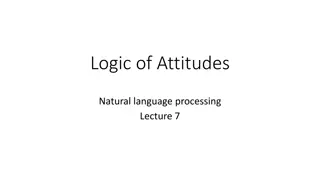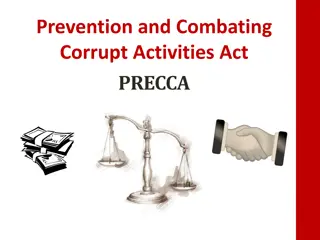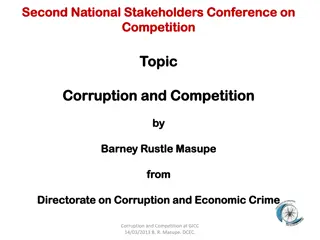Citizen Attitudes Towards Corruption in Serbia: A 2013 Report
Report prepared by CeSID DOO for UNDP Serbia in December 2013 delves into Serbian citizens' attitudes towards corruption, financial situations, and key problems. Findings reveal a mixture of optimism and concern among citizens regarding the direction of the country, highlight financial struggles faced by many, and shed light on major issues such as unemployment, poverty, and corruption.
Download Presentation

Please find below an Image/Link to download the presentation.
The content on the website is provided AS IS for your information and personal use only. It may not be sold, licensed, or shared on other websites without obtaining consent from the author.If you encounter any issues during the download, it is possible that the publisher has removed the file from their server.
You are allowed to download the files provided on this website for personal or commercial use, subject to the condition that they are used lawfully. All files are the property of their respective owners.
The content on the website is provided AS IS for your information and personal use only. It may not be sold, licensed, or shared on other websites without obtaining consent from the author.
E N D
Presentation Transcript
ATTITUDES OF SERBIAN CITIZENS TOWARDS CORRUPTION Report prepared for UNDP Serbia Report prepared by CeSID DOO, Belgrade December 2013
METHODOLOGICAL REMARKS Public opinion research agency CeSID and UNDP Serbia Research realised by Field work Period between December 07 and 17, 2013 Random, representative sample made out of 600 citizens of Serbia aged over 18 Type and sample size Polling station territory, as the most reliable registry unit Sample frame Random sampling with no substitutions every other house addresses, within the polling station area Random sampling with no substitutions selection of interviewees based on the first birthday method in relation to the survey day Household selection Selection of interviewees within households Research technique Face to face, within the household Research instrument Questionnaire 2
GENERALLYSPEAKING, DOYOUTHINKTHINGSIN SERBIAAREGOINGINTHERIGHTOR WRONGDIRECTION? 48% 49% In the wrong direction 45% 71% Optimism of Serbian citizens still remains at the December 2013 level . At this moment, almost one third of citizens (31%) are of the opinion that things in Serbia are going in the right direction! This represents the third research cycle where we note almost the same percent of citizens who express their optimism concerning Serbia's future. 73% 31% 2013 Dec 32% 2013 Jun In the right direction 32% 16% 2012 Dec 14% 2012 Jun 2011 Nov 21% 19% Doesn t know 23% 13% 12% 3
How would you assess your current financial situation? 45% 45% 45% 37% 37% 36% 36% 35% 31% 31% Doesn`t know Exceptionally good Fairly good 18% Bearable 16% 14% 13% 12% Bad 10% 9% 9% 9% Unbearable 6% 1% 1% 1% 1% 1% 1% 1% 0% 0% 0% 2011 Nov 2012 Jun 2012 Dec 2013 Jun 2013 Dec Since the beginning of the research project in 2009, we currently have the highest percentage of interviewees who believe their financial situation is unbearable (18%). If we take into account another 36% of those who describe their financial position as bad, we get a bit more than half of Serbian citizens whose finances are barely sufficient for survival. 4
WHAT ARE THE KEY PROBLEMS? 44% 43% Unemployment 44% 40% 41% 18% Negative parameters of living standards represent the precondition on the list of key problems the citizens of Serbia face. 15% Poverty 14% 23% 21% 12% 15% Corruption 15% 9% 12% 9% 6% Low salaries 6% 9% Poverty has pushed corruption from second to third position on the list of biggest problems the citizens face. 7% 7% 2013 Dec Lack of opportunities for young people 6% 7% 5% 5% 4% 3% Crime and security 3% 3% 2013 Jun 4% At this moment, immediately after unemployment which tops the list, poverty is the key problem for 18% of Serbian citizens; corruption is in third place, with 12% of those who see it as the biggest problem for Serbian citizens today. 2% 4% Feeble and inefficient institutions 3% 1% 2% 2% 2012 Dec 2% Poor education system 2% 1% 3% 2% 1% Pensions 1% 3% 2% 1% 2012 Jun 1% Health care 2% 2% 1% 0% 1% 2011 Nov Relations with Europe and the EU 2% 1% 1% 0% 0% Kosovo and Metohija 1% 1% 1% 5
THE INCIDENCE OF CORRUPTION Who paid, how much, to whom and why?
CORRUPTIONINCIDENCE 39% 38% 35% 34% 33% 26% 20% 19% 16% 15% 14% 13% 11% 11% 8% 8% 2009 Oct 2010 Oct 2009 Oct 2010 Oct 2011 Nov 2011 Nov 2013 Dec 2012 Jun 2012 Dec 2012 Dec 2012 Jun 2013 Jun 2013 Dec 2013 Jun 2010 Mar 2010 Mar Indirect experience Direct experience Only 19% of interviewees say that people close to them had experience with corruption in the previous three months, which is 1% less than a year ago. This is, at the same time, the lowest result since the beginning of this research project! 7
WHO GOT PAID? 48% 47% 25% 19% 19% 18% 15% 14% 12% 9% 9% 7% 7% 5% 5% 5% 5% 4% 4% 4% 3% 3% 3% 3% 2% 2% 1% 1% 1% 1% 0% 0% 0% Doctor Policeman Public administration Clerk Prosecutor Someone else Teacher/professor Tax official Customs Judge Attorney/lawyer Communal services 2012 Dec 2013 Jun 2013 Dec The trends we have been following in the last three cycles clearly single out doctors and police officers as professionals in the area where corruption is constantly present. We now see a rising trend also with regards to public administration clerks. In the last two cycles, almost half (48%) out of the total number of bribes given have connection with the health care system and doctors! 8
WHAT IS THEREASON FOR PAYING A BRIBE? 58% 57% 56% 56% 27% 24% 24% 22% 22% 19% 18% 17% 2013 Jun 2013 Dec 2013 Jun 2013 Dec 2013 Jun 2013 Dec 2013 Jun 2013 Dec 2013 Jun 2013 Dec 2013 Jun 2013 Dec They were directly asked to pay They offered to pay in order to avoid problems with relevant individuals They offered the bribe to obtain certain services I was directly asked to pay I offered to pay in order to avoid problems with relevant individuals I offered the bribe to obtain certain services Indirect experience Direct experience Almost 60% of Serbian citizens with direct or indirect experience with corruption have offered bribes THEMSELVES in order to obtain a certain service! However, we have to note that the number of cases where citizens were directly asked for a bribe is a bit higher than six months ago (rise from 19% to 22% in the category of citizens who were directly asked for a bribe). On the other hand, in cases of indirect experrience with corruption, the number of cases where citizens were directly asked for bribe has dropped by 3% (from 27% to 24%) in the past three months. 9
THEAVERAGEAMOUNTOFBRIBESPAID, ACOMPARATIVEREVIEW 300 255 250 250 205 200 178 169 168 164 150 103 100 50 0 2009 Oct 2010 Mar 2010 Oct 2011 Nov 2012 Jun 2012 Dec 2013 Jun 2013 Dec Worrisome statistics: the amount of bribes paid in the previous three months has passed the 200 Euros threshold for the third time! The highest average amount in the previous six cycles was 255 in October 2010. The findings from this cycle (average bribe amount of 250 Euros) show that it has become seriously close to the record amount from October 2010. 10
PERCEPTION OF CORRUPTION 2013 Dec 9% 11% 9% 46% 24% 1% doesn t know/no answer grew a lot 2013 Jun 10% 7% 11% 43% 27% 2% grew a little 2012 Dec 10% 8% 12% 45% 24% 1% remained the same 2012 Jun 9% 24% 24% 35% 8% 0% decreased a little decreased a lot 2011 Nov 7% 23% 25% 35% 10% 0% In this research cycle, the number of those who claim that the level of corruption in Serbia has dropped a little has fallen by 3%; this result shows that there are still some biases among citizens of Serbia surrounding the direction of the fight against corruption. 11
FUTURE OF CORUPTION IN SERBIA IN THENEXT 12 MONTHS doesn t know/no answer 2013 Dec 13% 9% 7% 43% 27% 2% grew a lot 2013 Jun 15% 7% 8% 37% 28% 5% will grow a little 2012 Dec 13% 4% 9% 33% 34% 7% will remain the same 2012 Jun 9% 19% 21% 36% 12% 3% will decrease a little 2011 Nov 11% 16% 21% 38% 13% 1% will decrease a lot Currently, only 2% of citizens expect the level of corruption to drop in the coming 12 months; this is by 3% less than six months ago. There was a symbolic drop (from 28% to 27%) of the number of citizens who claim that the level of corruption will decrease a bit in the next year. The bulk of the citizens (43%) believe that nothing significant will change with regards to corruption in Serbia. 12
CORRUPTION ISLURKING FROM...? Political parties 76% 77% 72% 72% 80% 2011 Nov Health care 74% 74% 69% 68% 71% 2012 Jun 2012 Dec Police 63% 64% 56% 65% 74% 2013 Jun Customs 63% 66% 52% 62% 59% 2013 Dec City/administra tion 55% 64% 51% 51% 59% Perception of the corruption levels within the political parties in December 2013 is the highest since the beginning of this research project and stands at a total of 80%! Parallel to the rise in corruption perception within political parties, there is a rise in the perception of corruption in almost all the institutions which the citizens perceive as the most corrupt in all research cycles (health care system, police, city administration ) in relation to June 2013. 13
HOWMUCHCORRUPTIONISTHEREINTHEKEYINSTITUTIONSOFTHESYSTEM? Parliament/legi slation 63% 65% 44% 48% 58% 2011 Nov 2012 Jun Government 67% 69% 47% 47% 57% 2012 Dec President of State 45% 47% 24% 29% 35% 2013 Jun 2013 Dec Army 25% 32% 13% 16% 20% Judging by the trends established based on the interviewees' responses, MORE AND MORE! At this moment the percent of citizens who believe that key institutions of the system (such as the national Government and the Parliament) are to certain extent or very corrupt is higher by 10% in comparison to only six months ago! The President is considered as corrupt by 6% more interviewees than in June 2013, and by 11% more than in December of 2012! 14
PERCEPTIONOFCORRUPTIONINTHEHEALTHCARESYSTEM 45 41 40 38 37 35 29 30 27 26 26 25 25 25 20 15 9 10 8 5 3 5 2 1 0 very much a lot medium a little none 2012 Dec 2013 Jun 2013 Dec More than two fifths of interviewees believe that corruption within the health care system is very much present, while there are 27% who say there is a lot of corruption in the system! 15
ONWHATGROUNDSDOYOUBELIEVETHATCORRUPTIONIS WIDESPREADWITHINTHEHEALTHCARESYSTEM? 0 I don t think corruption is widespread in the health care system 3 6 I see that health workers have small salaries, but live well, which means they are probably on the take 4 The percentage of interviewees with personal experience with corruption within the health care system has dropped by 7%.This can be interpreted as there being slightly fewer corruption cases in the past three months. 8 5 26 Information from media 18 23 45 Experience of friends, relatives 42 41 Personal experience, someone asked you or some of your friends/relatives for money, a gift or a favour 15 22 18 10 I don t know 7 7 0 10 20 30 40 50 16 2013 Dec 2013 Jun 2012 Dec
PERCEPTIONOFCORRUPTIONLEVELAMONGHEALTHCAREWORKERSIN SERBIA 2013 Dec 26 5 9 18 18 23 Health Care Branches of Fund 2013 Jun 27 9 5 21 18 20 Doesn t know 2012 Dec 28 9 8 18 19 18 2013 Dec 6 2 9 16 22 46 Not corrupt at all Doctors 2013 Jun 5 3 6 20 26 40 Corrupt a little 2012 Dec 5 4 7 19 29 36 Administrative 2013 Dec 13 17 23 19 16 12 personnel in hospitals Moderately corrupt 2013 Jun 13 23 22 20 12 10 Pretty corrupt 2012 Dec 13 20 23 21 12 10 2013 Dec 8 12 23 25 16 16 technicians Nurses and Very corrupt 2013 Jun 5 12 27 27 15 14 2012 Dec 7 15 24 27 15 12 The number of those who believe in absolute corruption among doctors has grown by 6% compared to the June 2013 research cycle! 17
PERCEPTIONOFCORRUPTIONLEVELINMEDICALINSTITUTIONS Rehabilitati on centres 2013 Dec 29 8 9 20 16 18 (spas, ) 2013 Jun 25 7 13 24 18 13 Doesn t know/NA 2012 Dec 23 7 13 26 19 13 2013 Dec 23 4 7 17 22 28 Clinical centre Doesn t exist at all 2013 Jun 16 3 9 20 26 26 2012 Dec 15 5 9 22 26 23 To a small extent 2013 Dec 23 4 8 18 22 26 Clinical- hospital centre 2013 Jun 16 3 9 23 22 27 To a medium extent 2012 Dec 15 4 9 20 26 25 2013 Dec 11 5 15 24 20 26 hospital General To a large extent 2013 Jun 8 6 17 26 24 18 2012 Dec 10 5 15 26 25 18 Health care 2013 Dec To a very large exten 11 12 27 17 18 15 centre 2013 Jun 6 16 28 25 13 12 2012 Dec 6 15 32 26 13 8 Trends regarding corruption levels in specific medical institutions, already established in previous two cycles, still stand. The corruption level is highest in clinical-hospital centres, clinical centres and general hospitals; a generally lower level of corruption is associated with rehabilitation centres and health care centres. 18
SOURCESOFINFORMATIONONCORRUPTION 74% 66% 60% 38% 35% 34% 34% 31% 31% 13% 13% 10% 2% 1% 0% Media Rumors Friends, relatives Personal experience Other sources 2012 Dec 2013 Jun 2013 Dec The smaller number of corruption cases in the previous three months has led to citizens claiming that they are informed about corruption through the media mainly, and less through their own or experiences of people close to them. 19
IFSOMEONEDIRECTLYREQUESTSABRIBEFROMYOU, WHATWOULDYOUDO? 40% 46% I d not pay 40% The number of interviewees ready to pay bribes has fallen to the level of March 2010. Back then, one in five were ready as well to pay for a solution of a problem or successful accomplishment of certain task, bypassing the legal procedures. 33% 33% 28% 32% I d look for someone to help me, without paying the bribe 34% 26% 29% 19% 18% I d report the case to bodies that implement the law 24% 2013 Dec 11% 13% 2013 Jun 20% 17% I d pay if I had the money 18% 17% 2012 Dec 15% There is continued stagnation in the category of interviewees who would report the case of bribe solicitation to the law enforcement bodies; there is also a drop in the category of interviewees who would report a case of corruption to the relevant administration. 9% 2012 Jun 14% I d report it to the administration 14% 11% 2011 Nov 10% 15% 14% Wouldn t do a thing, would wait for situation to change 9% 11% 10% 6% 7% I d report it to the media 4% 7% 8% 20
STAKEHOLDERSINTHEANTICORRUPTIONEFFORTS 46% 43% Government 41% 46% 41% 39% Since the very beginning, the Government was recognised as the body the citizens expect a lot in the process; in the last two cycles it has taken over the leading role in the battle against corruption from the police; Compared to the June research cycle, there is a rise from 39% to 41% of interviewees who believe that the police is the most adequate body to fight corruption in the country. Police 49% 47% 40% 27% Judiciary 37% 24% 29% 35% Anti-Corruption Agency 26% 13% 16% 19% Citizens (associations of citizens) 18% 11% 7% 3% Special elite forces 2013 Dec 5% 7% 5% 10% Ombudsman 2% 2013 Jun 2% 5% 5% President 9% 2012 Dec 4% As much as 40% of interviewees are of the opinion that the judiciary should lead the battle against corruption; this is the best score by the judiciary in the research project so far! 5% 3% Parliament 6% 2012 Jun 3% 3% 3% State audit institution 5% 3% 1% 2% NGOs 1% 1% 1% Commissioner for information of public importance and personal 1% 21 1% 1%
WHATISTHEBESTWAYFORFIGHTINGCORRUPTION? 82% 81% Harsh legal sanctions 79% 71% 66% 67% Improved legislation (new anti-corruption law, international conventions) 64% 69% 44% 49% 64% Strengthening of state control over public administration 62% 61% 47% 2013 Dec 48% 67% 2013 Jun 53% Raising the level of awareness of corruption 60% 47% 2012 Dec 46% 54% 2012 Jun Enforced control of civil sector (NGOs) over public administration 47% 51% 43% 2011 Nov 41% 43% 39% Transparency in administrative decision making 45% 40% 38% 26% Raised salaries for public administration employees 24% 33% 21% 30% Corruption and crime should be severely sanctioned, and 82% of interviewees stand for this! They expect a lot from the improvement of legal measures, but also from the strengthening of corruption awareness among the citizens of Serbia. Both forms of battle against corruption are supported by 67% of Serbian citizens each. 22
EFFICIENCYOFTHE GOVERNMENTOFTHE REPUBLICOF SERBIAINTHE FIGHTAGAINSTCORRUPTION 57% 53% 49% 35% 32% 23% 22% 21% 20% 11% 11% 9% 9% 9% 8% 8% 7% 7% 6% 2% Doesn t know/NA Very efficient Little efficient Mostly inefficient Not efficient at all 2012 Jun 2012 Dec 2013 Jun 2013 Dec The percentage of those who believe there is certain efficiency in the Government's efforts to fight corruption in the country remains the same as in the previous cycle (64%). We can see a stagnation in regard to the Government's work related to the battle against corruption as there is a smaller percentage of interviewees who evaluate its efforts as very efficient; there is a bigger number of those who say that it is less efficient. 23
PERCEPTIONOFTHEWORKOFTHE ANTI-CORRUPTION AGENCY
RECOGNISABILITYOFTHE ANTI-CORRUPTION AGENCY 77% 77% 77% 75% 65% 63% 60% 2010 Mar 2010 Oct 2011 Nov 2012 Jun 2012 Dec 2013 Jun 2013 Dec Recognisability of the Anti-Corruption Agency in the last three cycles remains the same, at a very high level - 77%. 25
AGENCYSCONTRIBUTIONTOTHEBATTLEAGAINSTCORRUPTION 29% 4% 2013 Dec 17% 35% 16% 28% 5% 2013 Jun 24% 31% 12% Doesn t know/NA 26% 5% 2012 Dec 24% 35% 10% Significant 20% 3% 2012 Jun 19% 38% Partial 20% 27% 2% 2011 Nov 22% A little 36% 13% 28% 3% None 2010 Oct 24% 32% 14% 33% 2% 2010 Mar 15% 29% 20% Calmer and less fervently covered work of the Agency by the media, in the period after the monitoring of electoral campaign financing - caused a decreased perception of this institution's activities in the eyes of average citizens. This has led to a smaller number of citizens who believe that the Agency provides adequate support to the battle against corruption at this moment. 26
